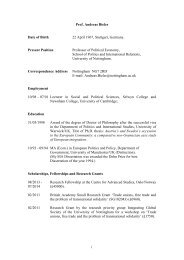Dr Gurnam Singh and Dr Stephen Cowden ... - Andreas Bieler
Dr Gurnam Singh and Dr Stephen Cowden ... - Andreas Bieler
Dr Gurnam Singh and Dr Stephen Cowden ... - Andreas Bieler
- No tags were found...
You also want an ePaper? Increase the reach of your titles
YUMPU automatically turns print PDFs into web optimized ePapers that Google loves.
3 | P a g eWhile the language here might come across as a bit stiff for today’s conservatives, the sameessential ideas resonate in the utterances of the former Chief Inspector of Schools in the UKChris Woodhead regarding policies of “Widening Participation”:A university ought to be an institution in which those young people who have theintellectual ability to benefit engage with the best that has been thought <strong>and</strong> written.The government’s...bleakly utilitarian view of higher education is unlikely to deliver theknowledge <strong>and</strong> skill the economy needs; its commitment to social inclusion iscalculated, through the manipulation of admissions procedures <strong>and</strong> the dumbing -down of academic st<strong>and</strong>ards, to destroy the prize it wants all to enjoy (Woodhead,2002).These quotes characterise the idea education should essentially be the province of the selectfew <strong>and</strong> that in Kingsley Amis’ infamous adage ‘more will mean worse’. However we wouldalso note that this opposition is no longer confined to traditional conservatives. In the 2004book Where Have All the Intellectuals Gone? sociologist Frank Furedi also takes up this issue ofinclusivity <strong>and</strong> in his analysis, the negative impact it has on st<strong>and</strong>ards. He notes that cynically:...in education...there are desperate attempts made to ensure that people achievesome kind of qualification. As a result st<strong>and</strong>ards are continuously reconfigured toensure that students succeed (2004:17)While Furedi denies that he is writing a “lament for a golden age” (2004:22), he occupiesremarkably similar territory to traditional conservatives such as Eliot <strong>and</strong> Woodhead, whoseviews are echoed in moral panics around ‘st<strong>and</strong>ards’ which are the stock-in-trade of the rightwing press in the UK. While Furedi’s work incorporates a critique of instrumentalisation alongsimilar lines to our argument, he accompanies this with uncritical praise of the ‘traditionalintellectual’ as the well-intentioned guardian of knowledge, effacing the exclusion upon whichthis system was based. Hence while appearing superficially critical, we would argue that Furedireinscribes the elitist idea that it is entry of the great unwashed into the educational systemthat is the source of its current problems; returning the debate once again to a zero-sum gameof inclusivity versus st<strong>and</strong>ards.In spite of our criticisms of the contemporary university <strong>and</strong> the concurrent commodification ofknowledge that accompanies it, we therefore argue against any nostalgia for ‘the good olddays’ – not least for the fact that these good old days were characterised by incredibly limitedparticipation in university life. It is in this context that we return to what we see as thecontemporary relevance of Paulo Freire’s work on critical pedagogy <strong>and</strong> emancipatoryeducation, both in relation to developing a critique of the contemporary zeitgeist, discussedabove, <strong>and</strong> in providing the materials for a different form of pedagogical practice.3 | P a g e



